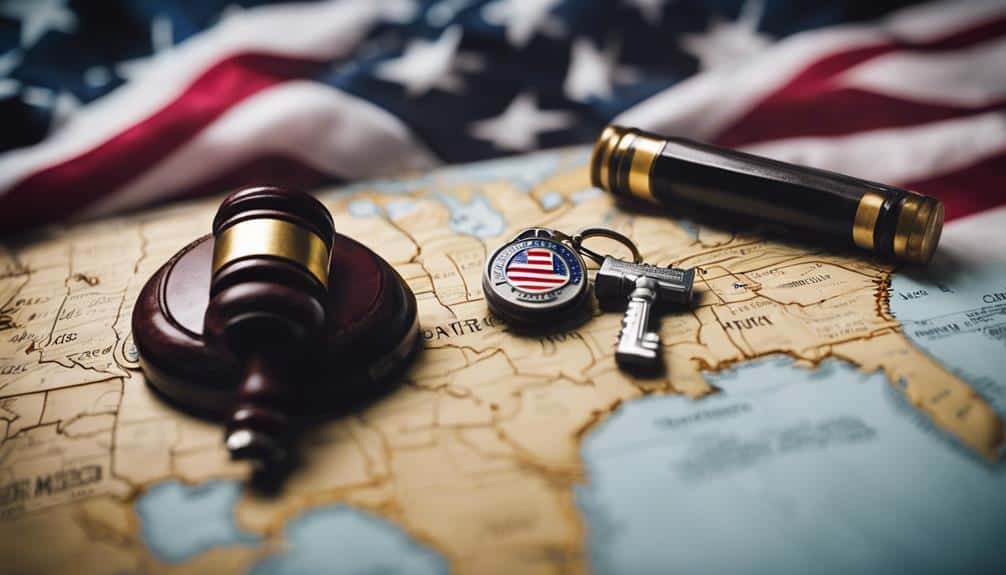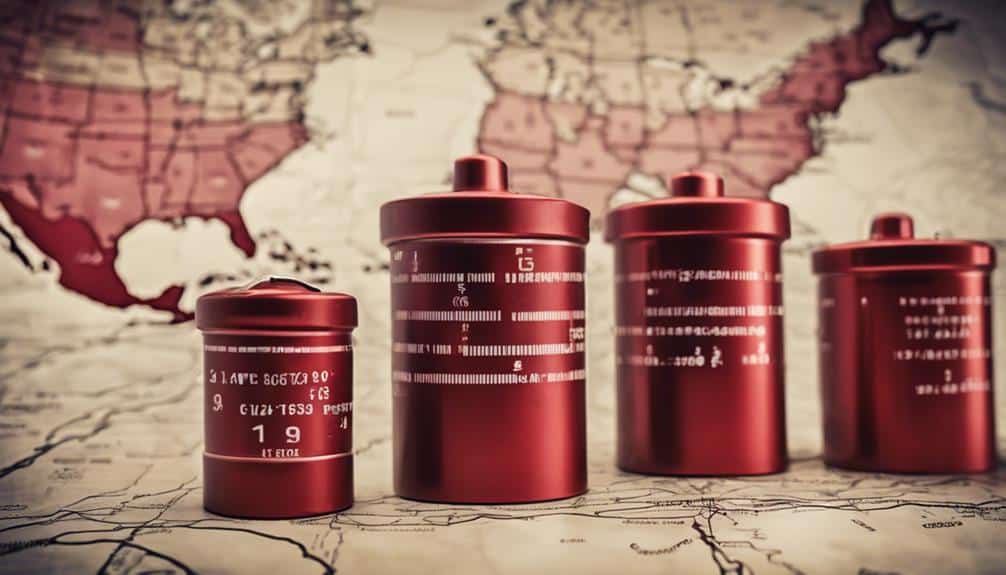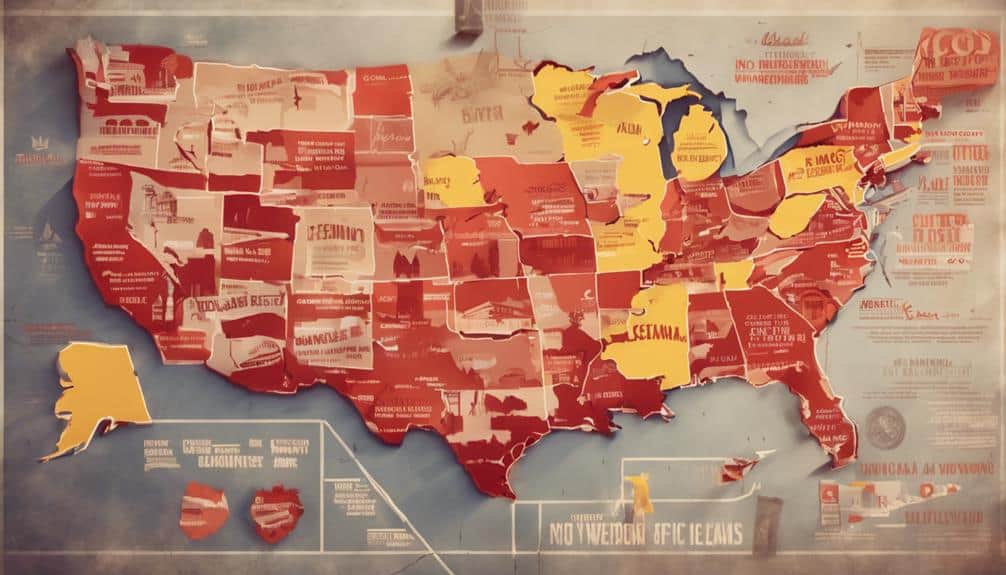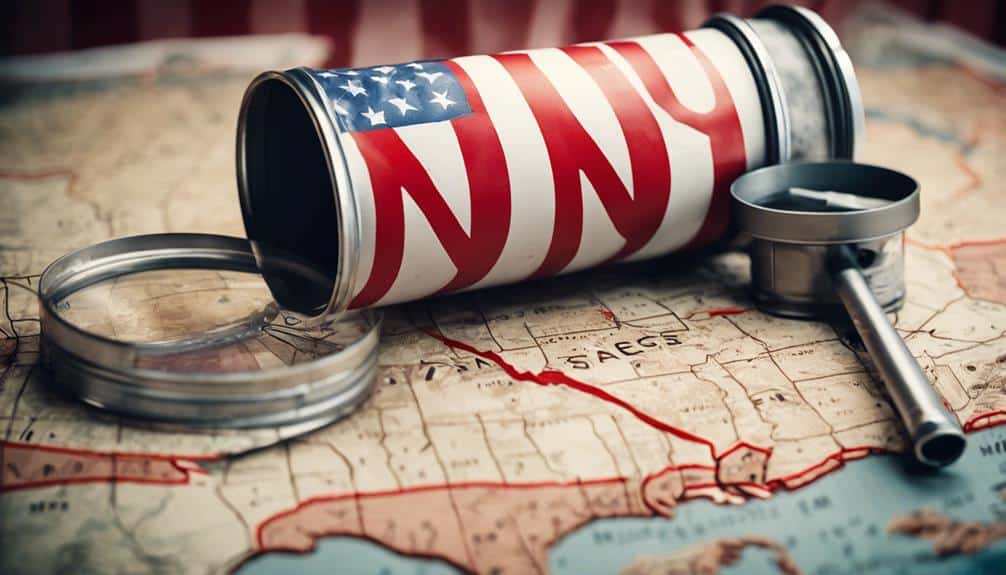When you consider carrying
mace for personal safety, it’s essential to know the varying
state regulations that govern its use. While it’s legal in all 50 states, the rules can be surprisingly complex. Did you know states like Massachusetts and New York have
strict laws about where and from whom you can buy mace? Even the size of the canister matters in places like California and Florida. Plus, certain locations, such as schools and government buildings, completely ban it. Curious about how these rules might affect your ability to
carry mace safely and legally? Let’s explore further.
General Legality of Mace
When it comes to the general
legality of mace, it’s important to know that while mace is
legal in all 50 states, there are
significant variations in regulations across different jurisdictions. You might think, “Great! I can carry mace anywhere!” But hold up—there’s more to it. Some states have
strict rules about what kind of mace you can carry and where you can buy it. For instance, in New York and Massachusetts, you can only purchase mace through
licensed dealers. These states don’t mess around when it comes to
self-defense tools. Additionally, products like
Pepper Shot often include unique features such as UV identifying dye to help identify an attacker later.
Now, let’s talk about restrictions. In places like Wisconsin and Michigan, it’s not just any old mace that’ll do. They’ve got
specific limitations on the strength and types of chemical agents allowed in mace formulations. So, you’ve got to check
local laws to make sure you’re not accidentally breaking any rules. Trust me, the last thing you want is to end up in hot water for carrying something meant for your protection.
Always remember, knowing the legality and regulations surrounding mace in your state is essential. Misuse can lead to
serious legal consequences, and no one wants that headache. Stay informed, stay safe!
Age Restrictions by State
Let’s talk about mace and
age restrictions—it’s kind of wild how the rules change from state to state! In Alaska, you’ve got to be 21 to have it on school grounds, while in places like Illinois and New Jersey, you need to be at least 18 to buy it. And then there’s Minnesota, where kids under 16 can
carry mace but only if mom or dad says it’s okay!
Minimum Purchase Age
Maneuvering the varying
age restrictions for purchasing and carrying mace across states can feel like a maze. You might think, “How hard can it be to buy mace?” But trust me, it’s more complicated than you’d expect. Most states set the
minimum purchase age at 18. This means that if you’re under 18, it’s typically illegal for you to buy or
possess mace.
However, some states take things up a notch. In Alaska, for instance, you must be 21 to possess mace on
school property. That’s right, even if you’re legally an adult at 18, Alaska’s got its own rules. States like Illinois, Maryland, New Jersey, and Rhode Island are strict,
prohibiting sales of mace to minors under 18. So, if you’re a teenager in these states, you’re out of luck.
Minnesota has a unique twist: if you’re under 16, you need a
guardian’s permission to carry mace. It’s like asking for a hall pass, but way more serious. And in Massachusetts, if you’re between 15 and 18, you need a
firearms identification card. It sounds intense, but it’s all about safety. So, know your state laws before thinking of buying mace!
Age-Restricted Possession Laws
Steering through the patchwork of
age-restricted possession laws for mace can be confusing, but it’s vital to stay informed. Most states set the
minimum age for
purchasing and possessing pepper spray at 18 years old. However, specific state laws can vary, so knowing the details is important.
In Illinois, Maryland, New Jersey, and Rhode Island, you can’t purchase pepper spray if you’re under the age of 18. These states have
strict restrictions to persons age 18 and older, ensuring minors under the age of 18 don’t get their hands on it. In Massachusetts, it’s a bit trickier. If you’re between 15 and 18, you need a
firearms identification card to buy mace. It’s like needing a permission slip but way more official.
Alaska has its quirks too. While you can generally
possess mace at 18, you must be 21 to have it on
school property. Imagine trying to explain that loophole to a high schooler!
Minnesota takes a different approach. Here, minors under the age of 16 can possess and use mace, but only with a
guardian’s permission. It’s like a family-level security clearance.
Understanding these specific state laws helps keep you compliant and safe.
Juvenile Usage Penalties
Maneuvering through the
penalties for
juvenile usage of mace can be intimidating, but understanding the specifics is essential. If you’re a minor, knowing these rules can save you from serious trouble. For instance, in Illinois, New Jersey, and Maryland, you can’t buy pepper spray or mace if you’re under 18. These states emphasize strict
age restrictions to guarantee safety.
In Minnesota, if you’re under 16 and want to carry pepper spray, you’ll need
guardian permission. It’s kind of like needing a hall pass, but way more serious. In Massachusetts, they take it a step further. If you’re between 15 and 18, you need a
firearms identification card to get your hands on pepper spray or mace. Talk about complicated!
Alaska has its own unique twist. On
school property, you have to be at least 21 to possess pepper spray. So, if you’re a minor, leave that canister at home to avoid any
legal consequences.
Reckless use of pepper spray can lead to serious injuries and hefty penalties, especially for minors. Each state has its own way of handling these incidents, but the bottom line is clear: follow the rules, or face the consequences.
Canister Size Restrictions
When it comes to carrying pepper spray, knowing the
canister size limits in your state is essential to staying within the law. Imagine trying to fend off an attacker with a tiny 0.75-ounce canister in
New York, while folks in
California can carry up to 2.5 ounces—talk about a size difference! Make sure you’re compliant with local rules, or that little can of security might land you in big trouble.
State-Specific Size Limits
Understanding the
state-specific size limits for
pepper spray canisters is essential for guaranteeing you’re compliant with local laws. Each state has its own pepper spray laws, and knowing these can save you a lot of trouble.
In
California, canisters cannot exceed 2.5 ounces, so don’t try to carry anything bigger.
Florida is even stricter, with a maximum canister size of just 2 ounces. If you’re in
New York, the cap is even lower—only 0.75 ounces, and the spray can’t be too strong either; it’s got a maximum capsaicinoid strength of 0.7%. South Carolina also has limits for
personal defense, restricting canisters to 1.69 ounces. Nevada aligns with Florida, with a maximum allowable canister size of 2 ounces. However, in New Jersey, you’ve got to keep it pocket-sized, under 0.75 ounces, unless you want to get in trouble.
You might think this is a lot to remember, but these restrictions are there for your safety and others’. Always check with licensed firearms dealers or
local authorities to guarantee you’re following state laws when you carry pepper spray. It’s better to be safe than sorry!
Legal Size Compliance
State-specific size limits on
pepper spray canisters are a vital aspect of
legal compliance you shouldn’t overlook. It might seem trivial, but the size of your pepper spray canister can mean the difference between legal peace of mind and a
hefty fine. Each state has its own regulations that you need to follow closely.
In California, for instance, you’re allowed a
maximum canister size of 2.5 ounces. It’s a decent amount for
self-defense, but don’t push your luck with anything larger. New York is stricter, allowing only up to 0.75 ounces and requiring a specific concentration of
capsaicinoids. You’d better double-check that label!
Florida’s a bit more lenient, with a maximum canister size of 2 ounces. Still, it’s essential to know these numbers like you know your best friend’s birthday. South Carolina caps it at 1.69 ounces—an odd number, but hey, rules are rules. And in Nevada, you’re looking at a 2-ounce limit as well.
Understanding these state regulations guarantees you’re not accidentally breaking the law. So, before you carry that pepper spray for self-defense, make sure your canister size is in line with state
possession and use laws.
Stay safe and compliant!
Licensing and Registration Requirements
Curious about the licensing and registration requirements for carrying mace or pepper spray? Let’s explore! Different states have unique rules, so it’s essential to know what’s needed before you grab that canister for self-defense.
In Massachusetts, you’ll need a license to purchase or carry pepper spray. If you’re a minor, there are specific age-related requirements to meet. New York is a bit stricter; you can only buy pepper spray from licensed firearms dealers, and you must register each purchase, with a limit of two sprays per transaction. Meanwhile, in Washington D.C., you’ve got to register your pepper spray with local police before you can possess it.
Here’s a quick look at some of these requirements:
| State |
Licensing Requirements |
Registration |
| Massachusetts |
Yes |
No |
| New York |
Yes, from licensed dealers |
Yes, limited to two sprays per purchase |
| Washington D.C. |
No |
Yes, must register with local police before possession |
| California |
No |
No, but specific labeling and usage instructions required |
While many states don’t require a license for purchasing or carrying pepper spray, local laws can vary. Always check your local regulations to stay on the right side of the law and confirm you’re ready to use your pepper spray safely and legally.
Prohibited Locations
Knowing the
licensing and registration requirements is just one piece of the puzzle when it comes to carrying mace. You’ve got to know
where you can’t take it too! First off, don’t even think about bringing mace on
commercial airlines. It’s not just a bad idea—it’s a felony! Imagine the chaos if someone let that loose at 30,000 feet.
Now, let’s talk about
secured buildings.
Government facilities, schools, and other secured buildings are major no-go zones for mace. You might feel safer with it, but you’ll be in big trouble if caught. In some places, you can’t use mace in
public places like parks or sports venues. It seems unfair, but it’s all about keeping everyone safe. Additionally, remember that some mace products, like the
Mace Pink Personal Model, include features like a UV detection dye which might be useful in certain scenarios.
Local ordinances can throw a wrench in your plans too. Different cities have their own rules. Some might ban mace on
public transportation, so check before you hop on that bus. If you violate these prohibitions, expect
penalties. It could be fines or even criminal charges, depending on where you are and what you did. So, always know the rules. It’s better to be safe than sorry!
State-Specific Regulations
When it comes to carrying
mace, the
laws can vary widely depending on which state you’re in. State-specific regulations can make traversing these rules feel like a maze. For example, in
New York and Massachusetts, you can’t just walk into any store and buy mace. You’ve got to purchase it from
licensed dealers, and there are strict limits on the
size and concentration of the spray. It’s all about keeping things safe while still allowing you to defend yourself. In New York, verify your pepper spray meets the state’s safety standards to avoid legal trouble.
In
Michigan, recent changes have tweaked the legal status of mace, but don’t worry, it’s still available for purchase and carry. You just need to stay updated on the latest rules. Wisconsin has its own set of quirks; it’s all about pepper spray here. Only
oleoresin capsicum sprays are allowed, so no CS or CN gas, which might be in some mace products.
Local law enforcement can sometimes throw in extra restrictions, too. Always check with them to confirm you’re following all the local laws. It’s crucial to know these details for
self-defense purposes, so you’re not caught off guard. Stay informed, stay safe, and keep your pepper spray handy!
Restrictions on Sales and Shipping
Restrictions on Sales and Shipping
Why are there so many rules around the sales and shipping of mace? Well, it’s all about safety and ensuring that these
self-defense tools don’t end up in the wrong hands. Mace, which is categorized differently than pepper spray in several states, has its own set of
legal hoops to jump through. For example, products like
Mace Canine Repellent are EPA approved for safe, humane protection but still face restrictions.
In New York, you can only buy mace from
licensed dealers.
Online purchases? Forget about it—unless you’re buying animal sprays. They’ve put these restrictions in place to make sure that only those who really need it can get it and to control possession more tightly.
Massachusetts has similar rules. Only licensed dealers can sell mace, and
selling to minors is a big no-no. These laws are designed to keep
potentially dangerous tools away from young, inexperienced users.
Michigan’s laws are evolving, reflecting ongoing changes in how they regulate the sale and legality of mace.
And in Wisconsin? They’re all about the details. They impose restrictions on the
chemical composition, allowing only legitimate pepper spray and excluding mace.
Legal Consequences of Misuse
Understanding the restrictions on sales and shipping is just one part of the equation; another vital aspect is the legal consequences of misusing mace. If you think it’s just a harmless spray, think again. Misusing mace can lead to severe legal consequences, including fines, imprisonment, and even civil liabilities. For instance, in California, using mace improperly can slap you with fines up to $1,000 or get you imprisoned. Yep, the law takes this stuff seriously!
Imagine using mace in the commission of a crime—you’re looking at enhanced penalties, longer sentences, and additional criminal charges. It’s not just a slap on the wrist; it’s a whole legal rollercoaster you don’t want to ride. Compliance with safety regulations is essential to avoid these severe penalties.
Here are some potential legal consequences of misusing mace:
- Fines: You could face hefty fines that dig deep into your pocket.
- Imprisonment: Jail time isn’t off the table, especially for severe misuse.
- Criminal Charges: Assault or battery charges could land you in even hotter water.
- Civil Liabilities: Victims might sue you for damages, adding more to your woes.
Frequently Asked Questions
When it comes to keeping the baddies at bay, pepper spray and mace differ mainly in their chemical composition.
Pepper spray boasts effectiveness with fewer long-term effects, while mace, with its historical background, faces more legal restrictions as a self-defense weapon.
What Are the Laws Around Mace?
You should know self-defense laws vary by state regarding mace. Weapon classifications, legal restrictions, and usage regulations differ. Check permissible quantities, transportation guidelines, and age restrictions to verify compliance with local laws before carrying mace.
Is Mace Legal in Texas?
Remember the Alamo? In Texas, mace is legal for self-defense. You don’t need a license but follow safety tips and storage guidelines. Mace usage regulations prohibit it in schools or government buildings. Make certain it meets manufacturing standards.
Is Pepper Spray Legal in Florida?
Yes, pepper spray is legal in Florida under specific pepper spray regulations. You can carry it as a self-defense tool without age restrictions. Just follow usage guidelines to avoid misuse, which can lead to legal repercussions.









One Response